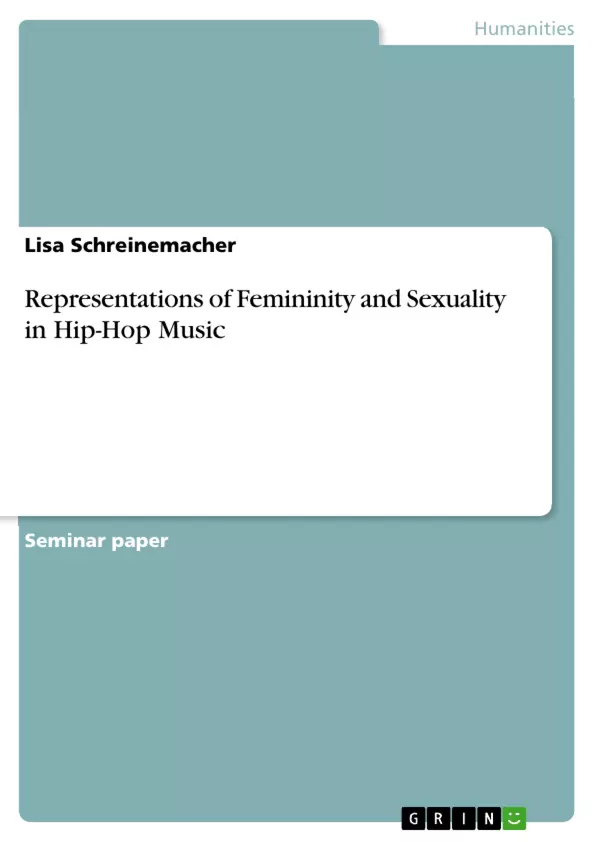A lot of research has been done that examined how Black women are presented in Hip-Hop songs by male artists. Especially rap music received much criticism, because it implied negative representations of women. Yet, how black female MC’s represent themselves is a topic that still needs more investigation. In the rare moments when women take the stage, it is noteworthy to examine the message of their songs. Therefore, this study is concerned with the question, in how far black female rappers make use of their femininity and sexuality from the beginning of Hip-Hop music until today.
Inhaltsverzeichnis (Table of Contents)
- Introduction
- Representations of the Black Female Body
- Usage of Femininity and Sexuality Through the Ages
- MC Lyte
- Lil' Kim and Missy Elliott
- Nicki Minaj and Cardi B
- Conclusion
Zielsetzung und Themenschwerpunkte (Objectives and Key Themes)
This paper examines how black female rappers utilize their femininity and sexuality in Hip-Hop music from the 1980s to the present day. It aims to analyze representations of the black female body and investigate how female MCs navigate and potentially challenge existing stereotypes through their music. This research builds upon previous studies, particularly Valerie Chepp's work on "Black Feminism and Third-Wave Women's Rap."
- Historical representation of the black female body
- The evolution of black female rappers' use of femininity and sexuality
- Analysis of selected black female MCs, including their musical styles and lyrical content
- The impact of Hip-Hop music on representations of women, both positive and negative
- The potential for female rappers to challenge and subvert gender stereotypes
Zusammenfassung der Kapitel (Chapter Summaries)
The first chapter delves into the historical representation of the black female body, tracing the roots of stereotypes from the enslavement of African Americans to the present day. It explores the image of the "promiscuous black woman" and its origins in historical contexts. Chapter three analyzes the music of several black female MCs, beginning with MC Lyte, considered a pioneering figure in the 1980s. Lil' Kim, known for her hypersexualized persona, and Missy Elliott, who presented a desexualized and creative image, are examined in separate subchapters. The chapter concludes with a discussion of contemporary artists Nicki Minaj and Cardi B, exploring their evolving approaches to femininity and sexuality.
Schlüsselwörter (Keywords)
This paper focuses on the themes of femininity, sexuality, and representation within Hip-Hop music, specifically addressing the experiences of black female rappers. It explores the intersection of race, gender, and power dynamics within the genre, highlighting the evolution of these issues through various artists and eras. Key concepts include stereotypes, empowerment, self-expression, and the potential for social and cultural change.
Frequently Asked Questions
How do female rappers use femininity and sexuality in their music?
Female MCs use these elements in diverse ways—from the hypersexualized personas of artists like Lil' Kim to the creative, desexualized imagery of Missy Elliott—to navigate and challenge industry stereotypes.
What is the historical context of the black female body in music?
The study traces stereotypes back to the enslavement of African Americans, exploring how the image of the "promiscuous black woman" has been used and subverted over time.
Who are the key artists analyzed in this study?
The research examines pioneering figures like MC Lyte, 90s icons Lil' Kim and Missy Elliott, and contemporary stars Nicki Minaj and Cardi B.
Can Hip-Hop be a tool for female empowerment?
Yes, the paper investigates how female rappers use their platform for self-expression, potentially challenging gender stereotypes and claiming power within a male-dominated genre.
How has the representation of women in rap changed since the 1980s?
The representation has evolved from the more gender-neutral or "tomboy" styles of early MCs like MC Lyte to the explicit and varied sexual identities presented by modern artists.
- Quote paper
- Lisa Schreinemacher (Author), 2018, Representations of Femininity and Sexuality in Hip-Hop Music, Munich, GRIN Verlag, https://www.grin.com/document/496141



